Honeymoon murder: Timeline of events for Shrien Dewani
- Published
The investigation into the murder of Anni Dewani has been ongoing since 2010.
The 28-year-old bride was murdered while on honeymoon with her husband, Shrien, in South Africa.
Mr Dewani was accused of orchestrating her murder. However, it took four years to bring him to trial.

The murder
On 13 November while on honeymoon in South Africa, newly-wed couple Shrien and Anni Dewani, from Bristol, are kidnapped at gunpoint in Gugulethu, a township near Cape Town. Mr Dewani, 30, is released unharmed at midnight in Harare.
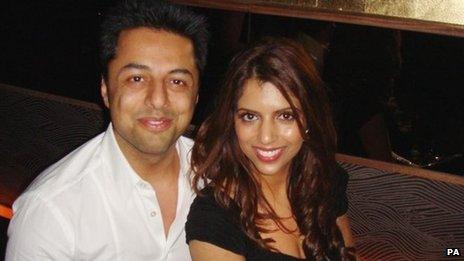
Newly-wed couple Shrien and Anni Dewani, from Bristol, are kidnapped at gunpoint on 13 November 2010
A day later, the body of Mrs Dewani, 28, is found on the back seat of the taxi she had been travelling in. She had been shot in the neck.
A murder hunt is launched by Western Cape police who say the driver of the couple's car was forced out before two armed suspects took off with the vehicle with the pair inside.
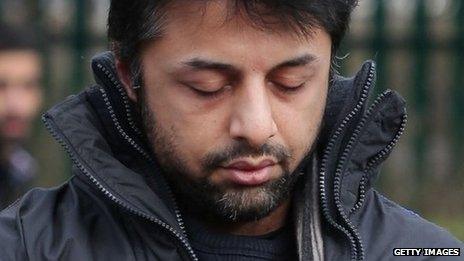
Shrien Dewani's lawyers suggest that his medical condition may have now become "untreatable"
Men charged
Three days after Mrs Dewani's body is found, Xolile Mngeni, 26, from Khayelitsha, is charged with her murder; robbery with aggravating circumstances; and kidnapping. He appears in court the next day and is remanded in custody.
Mrs Dewani's body is returned to the UK and her funeral takes place in London on 21 November.
The next day, Zola Tonga, 31, from Bothasig, and Mzwamadoda Qwabe, 26, from Khayelitsha, appear in court. They are both charged with murder; robbery with aggravating circumstances; and kidnapping.
Shrien Dewani - who returned to the UK shortly after his wife's death - receives medical help to deal with the trauma of the incident. In a statement, Mr Dewani's brother Preyen dismisses "totally false accusations" blaming him for what happened to Anni Dewani.

Extradition battle
The couple's taxi driver, Zola Tongo, alleges he was offered 15,000 rand (£1,400) by Mr Dewani to kill his wife. Tongo says he spoke to a friend about arranging a hitman and was put in touch with Mr Mngeni and Mr Qwabe. Mr Dewani's family describe the allegations as "totally ludicrous". Tongo is jailed for 18 years for his part in the killing.
On 8 December Mr Dewani is arrested at the request of the South African authorities on suspicion of conspiracy to murder. The South African justice department says it will initiate full extradition proceedings when it receives further documentation from prosecutors. Mr Dewani later appears at the City of Westminster Magistrates' Court. He says he will not consent to being extradited.
Mrs Dewani's uncle, Ashok Hindocha, appeals for Mr Dewani not to resist extradition to South Africa.
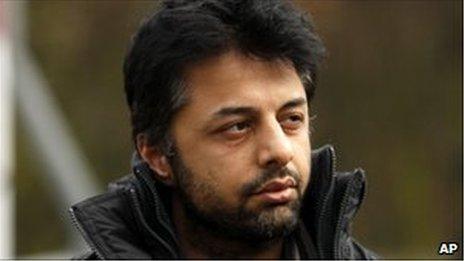
The Bristol businessman is diagnosed as suffering from severe depression and post-traumatic stress disorder
On 20 January 2011, Mr Dewani's solicitor tells the City of Westminster Magistrates' Court that his client is suffering from an acute stress disorder, and extradition proceedings are adjourned. Just over a month later Belmarsh Magistrates' Court hears that Mr Dewani had taken a cocktail of 46 pills including diazepam, which was prescribed to counter anxiety and help him sleep.
The South African authorities argue that Mr Dewani should have his bail revoked. His psychiatrist, Dr Paul Dedman, rejects the idea that there had been a suicide attempt. District Judge Howard Riddle decides he can remain on bail.
On 20 April, Mr Dewani is detained at the medium security Fromeside Clinic in Bristol under the Mental Health Act. A fortnight later, a three-day extradition hearing starts at Belmarsh Magistrates' Court. Hugo Keith QC, representing the South African authorities, says a witness told how Mr Dewani said he "needed a way out" of his marriage. The court also hears that Mr Dewani would not be mistreated in a South African prison.
Nearly four months later, a judge rules that Mr Dewani can be extradited to South Africa to stand trial over the murder of his wife Anni. However, the decision will have to be ratified by Home Secretary Theresa May.
It is later ruled that Mngeni and Qwabe will go on trial at the Western Cape High Court in 2012.
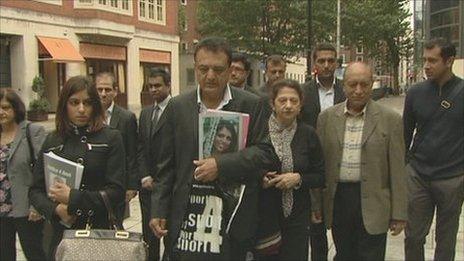
The petition is handed to an official by Mrs Dewani's family
Mrs Dewani's family hand a petition to the Home Office containing 11,411 signatures calling on the home secretary to grant the South African government's request to extradite Mr Dewani. Home Secretary Theresa May eventually signs an order for Mr Dewani's extradition to South Africa but lawyers for Mr Dewani lodge an appeal against the decision.
On 13 December, a four-day appeal hearing takes place against the decision that Mr Dewani should be extradited to South Africa. His lawyer says he is not faking mental illness in order to avoid extradition. The hearing is told that the jails where Mr Dewani would be held are the best in South Africa. It is decided a judgement will be delivered in the new year.
More than three months later two High Court judges rule that it would be "unjust and oppressive" to order Mr Dewani's extradition, which is temporarily halted on the grounds of his mental health. But the court says it is in the interests of justice that he should be extradited "as soon as he is fit" to be tried.

Men sentenced
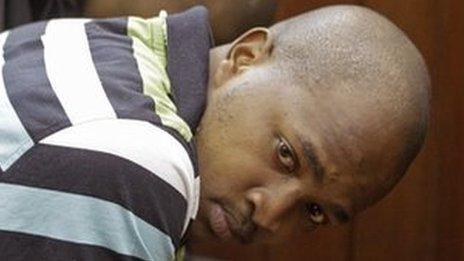
Mziwamadoda Qwabe is sentenced to 25 years in prison for the murder of Anni Dewani
On 8 August 2012, Mziwamadoda Qwabe is sentenced to 25 years in prison for murdering Mrs Dewani. He says the murder had been organised by Mr Dewani, and that taxi driver Zola Tongo and Xolile Mngeni had also taken part. The following week, Xolile Mngeni pleads not guilty to murdering Anni Dewani at the Western Cape High Court, in Cape Town.
In September it is revealed that Mr Dewani is to apply to be treated on an open rehabilitation ward after an improvement in his mental health. Later, Westminster Magistrates' Court hears that moving Mr Dewani to an open rehabilitation ward may increase his "flight risk".
On 19 November, Xolile Mngeni is convicted of firing the shot which killed Anni Dewani. He is found guilty of murder by a judge in Cape Town and is sentenced to sentenced to life in prison. A judge rules that he is an "evil person" who fired the shot that killed Mrs Dewani.
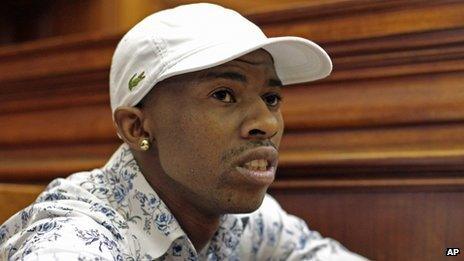
A judge says that Xolile Mngeni showed no remorse

Extradition granted
On 2 July 2013, a four-day hearing into the potential extradition of Mr Dewani is held. Westminster Magistrates' Court in London hears that Mr Dewani's post-traumatic stress disorder and depression have eased.
Three weeks later, a judge rules that Mr Dewani should be extradited to South Africa to face trial over his wife's death. Chief magistrate Howard Riddle tells Westminster Magistrates' Court: "It may be a long time before Mr Dewani is fit to plead, but he may be closer to that point. It is not impossible that if returned now, then after a reasonable period of further treatment and assessment he will be found fit to plead and a trial can take place."
Ami Denborg: "We just want to know what happened to Anni"
In August, Mr Dewani's lawyers say they are to launch a bid to take his case to the Supreme Court. and two months later their right to an appeal is won and Mr Dewani's case against his extradition to South Africa is to be reopened at the High Court in London. Outside court, Anni Dewani's mother, Nilam Hindocha, says: "I was brought up to believe British justice is the best in the world, so it is very hard to understand why we are still here. I am the mother of a murdered daughter. How long do I have to wait?"
Four months later, on 31 January 2014, the High Court rules that Shrien Dewani, who remains in hospital, can be extradited to South Africa. His legal team continues to argue that he should not be sent there until he is fit to plead.
A week on, the Judicial Office confirms an application has been made to the Supreme Court to rule on the extradition of Mr Dewani. A possible return to South Africa will once again be delayed because of this latest court application.
The Supreme Court application is blocked with the High Court refusing to allow a further appeal, triggering a 28-day period during which Mr Dewani must be extradited. His lawyer, Mark Summers, tells the panel of judges that fresh evidence that suggests that "his underlying medical condition may be chronic - incapable of being treated".
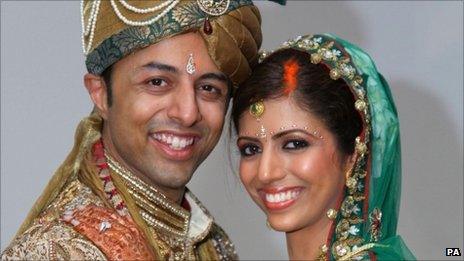
The family of Anni Dewani say they "need justice"
In April, South African officials await the arrival of Mr Dewani who has been extradited and is due to arrive in Cape Town on Tuesday. "He is not on a honeymoon. He is not on holiday. He is here to stand trial and we want to see that happen within a reasonable period of time," says a spokesman for the country's department of justice.
The trial
On 6 October, Shrien Dewani's trial begins in Cape Town. He tells Western Cape Crown Court how his "whole world came crashing down" following his wife's murder. He also revealed to the court that he is bisexual.
On the second day of the trial, Mziwamadoda Qwabe, who was sentenced to 25 years in prison for the murder, says he was asked to make it look like a hijacking. Prosecutors claim Mr Dewani conspired with him along with Zola Tongo and Xolile Mngeni.
The court was told on 21 October that Anni Dewani had wanted a divorce from her new husband.
CCTV footage of Shrien Dewani meeting Zola Tongo, the man convicted of arranging the murder of Anni Dewani, was shown in court on 5 November.
On 17 November, lawyers for Mr Dewani said they were to apply for the case to be dismissed.
Just over two weeks later, the trial was thrown out by Judge Jeanette Traverso who said the prosecution's evidence fell "far below the threshold", including testimony from the key witness which was "riddled with contradictions".
Anni's family said they had been failed by the justice system and would be consulting their lawyers on possibly filing a lawsuit against Mr Dewani in the UK.